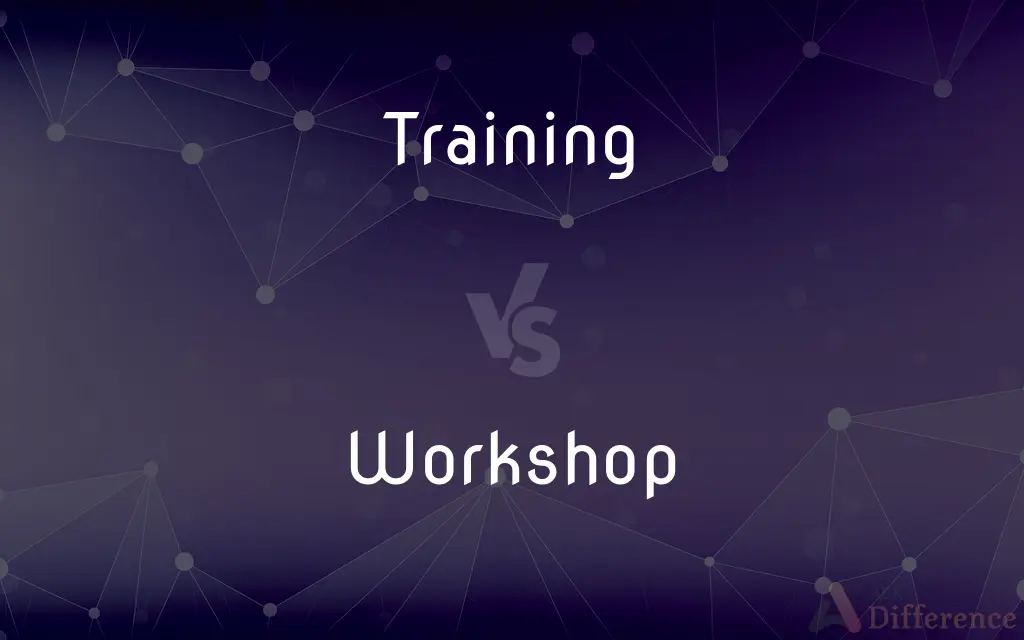Training vs. Workshop — What's the Difference?
By Tayyaba Rehman — Updated on September 23, 2023
Training is a structured program aimed at enhancing specific skills or knowledge over a longer period. A workshop is a short, interactive session focused on learning or practicing a particular skill or concept in a hands-on manner.

Difference Between Training and Workshop
Table of Contents
ADVERTISEMENT
Key Differences
Training is generally a longer, more structured process that aims to develop specific skills or impart particular knowledge. It may be formal or informal and is often spread out over a period of time. Workshops, on the other hand, are shorter, more focused events, usually lasting from a few hours to a day, aimed at teaching or enhancing a specific skill in a hands-on setting.
Training often involves a curriculum or set program that participants follow, potentially leading to some form of certification or qualification. Workshops usually lack such long-term structure and are less likely to offer certification. They are typically designed for immediate, practical engagement with a subject.
In terms of format, training sessions may involve various teaching methods like lectures, simulations, and hands-on exercises, often combining multiple elements over an extended period. Workshops are generally more interactive, emphasizing hands-on activities and direct engagement with the subject matter, usually guided by a facilitator or expert.
The context in which training and workshops occur can also differ. Training programs are often part of larger educational or corporate structures, like university courses or employee development programs. Workshops are more commonly standalone events, often organized by professional organizations, hobbyist groups, or community centers.
Comparison Chart
Duration
Longer term
Short term
ADVERTISEMENT
Structure
Structured program with curriculum
Usually no set curriculum
Certification
Often leads to certification
Rarely leads to certification
Teaching Methods
Varied, including lectures, simulations
Hands-on, interactive
Context
Educational or corporate settings
Standalone events, often organized by groups
Compare with Definitions
Training
Training is a structured educational process aimed at skill or knowledge development.
Her job provided training in customer service techniques.
Workshop
A workshop is a brief, intensive educational program focused on a particular subject.
She attended a one-day writing workshop.
Training
Training can occur in various settings, including schools and workplaces.
The company mandates annual safety training for all employees.
Workshop
A workshop is typically hands-on and interactive.
The workshop included group activities and discussions.
Training
Training may lead to certification or qualification.
After completing the training, she earned a certificate in project management.
Workshop
Workshops are commonly organized by professional organizations, community groups, or educational institutions.
The local community center hosted a gardening workshop.
Training
Training can be formal or informal.
He received informal training from watching online tutorials.
Workshop
A workshop usually lasts for a short duration, often a day or less.
The painting workshop lasted three hours.
Training
Training is teaching, or developing in oneself or others, any skills and knowledge or fitness that relate to specific useful competencies. Training has specific goals of improving one's capability, capacity, productivity and performance.
Workshop
A workshop is often facilitated by an expert in the field.
The workshop was led by a renowned photographer.
Training
The process or routine of one who trains.
Workshop
Beginning with the Industrial Revolution era, a workshop may be a room, rooms or building which provides both the area and tools (or machinery) that may be required for the manufacture or repair of manufactured goods. Workshops were the only places of production until the advent of industrialization and the development of larger factories.
Training
The state of being trained.
Workshop
A room, area, or small establishment where manual or light industrial work is done.
Training
Present participle of train
Workshop
An educational seminar or series of meetings emphasizing interaction and exchange of information among a usually small number of participants
A creative writing workshop.
Training
Action of the verb to train. en
Workshop
To create or revise (a drama or literary work) based on suggestions or criticism from a group of collaborators.
Training
The activity of imparting and acquiring skills.
Workshop
A room, especially one which is not particularly large, used for manufacturing or other light industrial work.
Training
The result of good social upbringing.
Workshop
A brief, intensive course of education for a small group, emphasizing interaction and practical problem solving.
Training
(computing) The process by which two modems determine which protocol and speed to use; handshaking.
Workshop
An academic conference.
Training
(voice recognition) The recording of multiple samples of a user's voice to aid pattern recognition.
Workshop
(transitive) To help a playwright revise a draft of (a play) by rehearsing it with actors and critiquing the results.
Training
The act of one who trains; the act or process of exercising, disciplining, etc.; education.
Workshop
(transitive) To work on or revise something, especially collaboratively, in a workshop.
Training
Activity leading to skilled behavior
Workshop
To improve through collaboration.
Training
The result of good upbringing (especially knowledge of correct social behavior);
A woman of breeding and refinement
Workshop
A shop where any manufacture or handiwork is carried on.
Training
Training often involves a set curriculum or program.
The training course lasted six weeks.
Workshop
Small workplace where handcrafts or manufacturing are done
Workshop
A brief intensive course for a small group; emphasizes problem solving
Common Curiosities
What is the primary goal of Training?
The primary goal of training is long-term skill or knowledge development.
Does Training always have a set curriculum?
Training often involves a set curriculum, though it can be formal or informal.
How long does Training usually last?
Training is usually longer-term, potentially spread over weeks, months, or even years.
What is the primary goal of a Workshop?
The primary goal of a workshop is immediate, hands-on engagement with a specific subject.
Can Training be informal?
Yes, training can be either formal, with a structured curriculum, or informal.
Does a Workshop offer certification?
Workshops rarely lead to certification, focusing more on practical skills.
Is a Workshop always hands-on?
Workshops are generally hands-on and interactive, though the extent can vary.
Do you receive a certificate after Training?
Training often leads to some form of certification or qualification.
How long does a Workshop usually last?
Workshops are usually short-term, often lasting a few hours to a day.
Who typically conducts Training?
Training is often conducted by educational or corporate institutions.
Is a Workshop more theoretical or practical?
Workshops are usually more practical, focusing on hands-on activities.
Do you receive a certificate after a Workshop?
Rarely, as workshops focus more on immediate skill or knowledge enhancement.
Can anyone attend a Workshop?
Generally, yes, though some workshops may have prerequisites or be aimed at specific audiences.
Who typically conducts Workshops?
Workshops are often conducted by professional organizations, community groups, or individuals.
Is Training more theoretical or practical?
Training can be either theoretical or practical, often combining multiple teaching methods.
Share Your Discovery

Previous Comparison
Vehicle vs. Automobile
Next Comparison
See vs. SeaAuthor Spotlight
Written by
Tayyaba RehmanTayyaba Rehman is a distinguished writer, currently serving as a primary contributor to askdifference.com. As a researcher in semantics and etymology, Tayyaba's passion for the complexity of languages and their distinctions has found a perfect home on the platform. Tayyaba delves into the intricacies of language, distinguishing between commonly confused words and phrases, thereby providing clarity for readers worldwide.















































